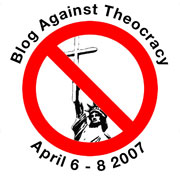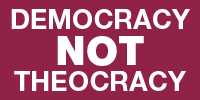Blogging Against Theocracy
Even if George W. Bush has succeeded in drastically expanding the power of the executive branch, there is no anointed king here in America. No president has claimed to be a god, and senators are not priests.
In the United States, claims to divine authority tend to be somewhat more subterranean and implicit, if no less powerful. The religiously-tinged ideas of “manifest destiny” and “American exceptionalism” have served as covers for territorial acquisitions, genocidal violence, exploitation, and domination here and around the world. Domestically, I hope every American is aware of the costs to native tribal communities. Slavery was also rationalized under the banner of religion. The Massachusetts Bay Colony was dominated by Puritan ideology, and there were scattered theocracies across the colonies until they agreed to freedom of religion.
The pledge of allegiance, already a creepy nationalistic ritual, has claimed since 1954 the status of the nation as existing under (the protection of? guidance of? stamp of approval of?) God.
The literal meaning of theocracy is “rule by God or gods.” Theocratic governments can be formed of any significant mixture of claims to divine authority, the wielding of secular power by religious groups or figures, or a melding of the state with religion such that religious freedom is not possible. While there are subsets of society – intentional religious communities – that could be considered theocracies, these are protected under freedom of religion in the United States. We are in danger of – already in the the process of – forming a governmental theocracy here in the land of the free, and that is an entirely separate issue.
The specific theocratic threat to our nation right now is the erosion of the separation of the powers of church and state under an attempted coup by a very specific kind of christian ideology – dominionism.
Dominionism – a trans-denominational movement composed of radical fundamentalist, charismatic, and pentacostal protestants – openly seeks to establish totalitarian control over the nation and its people. To further their stated goals of secular domination, they have called for their followers to exert whatever influence they can – at any and every level and aspect of society – in order to bring our society into conformity with their beliefs.
Several years ago, these radical extremists found common purpose with the Republican party, which needed to expand its base (an interesting mirroring – al Qaeda: translation “the base”). Politics entered the congregations, and the congregations infused the party. Despite the uneasy nature of this unholy communion, the agendas of dominionists and their followers are now an established force in American politics. Their version of God’s requirements was very convenient.
Please remember that not all christians are dominionists. Many still understand that the kingdom of God is within, and that humility is a christian virtue. Some christians still remember and advocate forgiveness, compassion and kindness.
Dominionists, on the other hand, seem very comfortable with throwing the first stone (and any further stones that may be required). Instead of freedom and justice for all, they seek conformity to their warped (and very selective) biblical interpretations. Some do so because they honestly believe that it is ordained by God and destiny; others do so for even more unsavory reasons. All this under a paranoid fantasy of persecution, and in the name of a special – even exclusive – relationship with the divine.
In many ways, dominionism is an anti-christian movement. “Christian Reconstruction looks more like straightforward destruction of the Christian message and its values. Setting a christian example? Their version looks like a dance of hatred. I will never believe that power-hungry control freaks speak for God, or represent the teachings or example of Jesus, or stand for any profound religious insight at all. They do not help to bring people into a relationship with the divine, but instead appeal to the darker aspects of their followers while appearing to shine as angels of light. I believe that the beliefs and actions of such extremists are in profound contradiction with deeper spiritual truths.
I name you and yours false prophets
because you do define the phrase,
You lead the would-be faithful
always far and further astray.
Placing demon masks
on the faces of our kin,
undoing all the fragile good
that lets us breathe again.
More compassion-based religious people should continue to engage in debates and discussions about the issues – spiritual, ethical, even biblical – raised by dominionists, as well as the questionable interpretations that they rely upon. A wealth of credible biblical scholarship is available, and it is time for it to become more widely known. Contextual ethics needs to re-enter the public sphere as well.
No American should be forced to comply with (or participate in) any particular religious ideology, and this is especially the case for one that has such destructive repercussions on American life and liberty, and which seems to represent a fairly hateful infantile sort of God-character. In addition, let’s remember that freedom of religion also implies freedom from religion and its organizations.
I was raised as a Jehovah’s Witness, and I have seen some of the costs of pseudo-religious authoritarian control in terms of the real human lives it affects.
Jehovah’s Witnesses describe themselves as a theocracy. In their case God lives in Brooklyn, so to speak. God’s power, spirit and guidance are believed to be directed through the members of God’s channel (a group of men known as the Governing Body) and transmitted through the Watchtower magazine and other publications. Their somewhat anonymous leaders and authors claim to be a few of the 144,000 “slave class” who they believe are intended to rule with Christ over the post-apocalyptic paradise earth. Ever “faithful and discreet,” this slave class has created a very lucrative publishing empire with an unpaid sales force – the “great crowd.” The great crowd are second-class citizens, although they do not recognize themselves as such since most of them would rather live in Paradise than in Heaven. Still, they are unworthy of even partaking of the wine and bread at their yearly memorial of the last supper. In addition to their publications, the Watchtower corporations control their followers with circuit overseers, district overseers, local uneducated elders, multiple weekly meetings of repetitive pseudo-bible study, family and congregational peer pressure, and the threat of shunning. Their followers live in expectation of God’s immanent (and loving) slaughter of most of humanity at the hands of the Prince of Peace. Their judgment of society is just as rigid as the dominionists, with many of the same hatreds and prejudices, but their reaction is to separate their people from “worldly influences.” They don’t vote or salute the flag. They don’t fight in worldly wars. They don’t run for office, or join the boy scouts, or celebrate “pagan” holidays like Christmas, or even accept the blood of others to save their children’s lives.
From my perspective, dominionists are something like an example of “When Jehovah’s Witnesses Attack.”
America’s contract with its citizens is to be (or at least try to be?) a land of freedom, with liberty and justice for all. The rise of religion in America is directly associated with the national experiment of religious freedom. Without the separation of religion and the government, and the accompanying protection of religious freedom, religious groups could never have thrived as they do in this country. We have an amazingly diverse religious population, and this is because every American is free to choose the path of his or her own religious journey.
This weekend, many Americans are celebrating the risen Christ – whether with or without the traditional elements of spring fertility signified by the Easter bunny, bright clothing, and the hunt for colorful eggs filled with candy treats. Other Americans are observing the traditions of Passover. Others celebrate something else, or nothing at all.
Whatever your religious tradition or inclination, I would ask you – please – to take a moment or two to reflect upon the nuggets of spiritual insight that you may have collected and found to be valuable and wise. Consider whether any of them involve hatred, domination, or control over others.
It is an insecure (and I think inauthentic) kind of faith that cannot stand on its own merits and inspire others with its goodness. It is pure spiritual arrogance – hubris, really – to believe that anyone has the whole truth about God, or that they must impose it on everyone else. We are human. To target fellow humans simply because they do not subscribe to one fallible interpretation of what God may want of humanity is profoundly anti-religious. To do so at the level of government is anti-American. And to do so under the mantle of a claim of divine authority may be the closest thing I know of to blasphemy.
Is this not a sin against the spirit of love? Does this not take God’s name in vain?
There is no authentic spirituality based on fear and hatred of others or on the endless quest for power.
“There is no disguise that can for long conceal love where it exists or simulate it where it does not.” – Francois de La Rochefoucauld
“Fear is the path to the dark side. Fear leads to anger. Anger leads to hate. Hate leads to suffering. I sense much fear in you.” – The character of Jedi master Yoda, in Episode I of the Star Wars films
Be sure to check out the other blog posts on the Blog Against Theocracy swarm. The logo was designed by Tengrain of Mock, Paper, Scissors.
A big thank you to Jolly Roger at Reconstitution for the invitation to join in. Thanks for thinking of me (smile).

